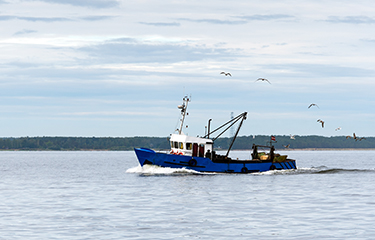An agreement on next year's fishing opportunities in the Baltic Sea has been reached, with the focus on stock recovery by reducing the quotas for most but not all fisheries, the European Council has confirmed.
At the AGRIFISH Council in Luxembourg on 19 and 20 October, European Union fisheries ministers decided to continue the closure of the eastern Baltic cod fishery and to provide only a bycatch quota, which was again significantly reduced compared to last year. The biggest cuts in the total allowable catches (TACs) were for the herring of the western and central part of the Baltic Sea.
In line with the latest scientific advice, it was agreed to reduce the western herring catch by 50 percent, and the central herring TAC by 36 percent compared to last year.
In total, 8 out of 10 TACs have been set at sustainable levels.
Ministers agreed for a moderate increase of the TACs for herring in the Gulf of Riga, western Baltic cod, plaice, sprat and salmon in the main basin area of the Baltic Sea, while salmon in the Gulf of Finland will be moderately decreased. The TACs for the Bothnian herring will remain at the same level as last year.
“This agreement is a viable solution forward for fishermen and fishery resources in the Baltic Sea. It is an agreement that strengthens our efforts to sustain and help stocks recover while ensuring activities for fishermen,” Germany’s Federal Minister for Food and Agriculture, Julia Klöckner, said.
Based on a European Commission proposal, the agreed quantities take into account the commitment to meet the objectives of the Common Fisheries Policy (CFP) – including the achievement of maximum sustainable yield (MSY) – as well as scientific advice provided by the International Council for the Exploration of the Sea (ICES).
In addition to setting TACs and quotas on some species, the council agreed on additional measures such as:
- Maintaining the existing summer spawning closure for the eastern Baltic cod, with an exception for purely scientific fisheries and small-scale coastal fisheries using specific gears.
- Extending the spawning closure period for cod in subdivision 24.
- Maintaining the ban on recreational fisheries of eastern Baltic cod, and maintain the reduced bag limit for western Baltic cod recreational fisheries.
- A declaration by relevant member states not to use year-to-year flexibility for eastern Baltic cod.
In a statement, E.U. Environment, Oceans, and Fisheries Commissioner Virginijus Sinkevičius said that the negotiations came at a very difficult moment, both for the fishing community and for the environment.
“Our fishermen and women in the Baltic region are hit hard by the economic fallout of the coronavirus pandemic. The E.U. and member-states have made many efforts to soften the impact, but for many businesses, the situation is still precarious. Thus the welfare of our fishing communities has been at the top of our minds throughout our discussions,” he said. “But while the causes of the current state of the Baltic are complex and manifold, it is clear that if we fish beyond our means today, we will pay the price tomorrow. We have to allow stocks to replenish to healthy levels. This was the rationale of the commission’s proposal. I am pleased that the member-states have kept to the same spirit.”
A number of environmental NGOs have welcomed the Baltic fishing limits for 2021, but some have also warned that they are still not enough to save the herring, cod, or Baltic Sea ecosystem and communities that depend on them, and have urged more efforts to take ecosystem needs into consideration.
“The poor status of the marine ecosystem in the Baltic makes fisheries management challenging, which is why it is particularly relevant to set catch limits for fish populations in line with scientific advice and reflecting wider ecosystem considerations,” Oceana Europe Campaign Director for Sustainable Fisheries Javier López said.
Our Fish Program Director Rebecca Hubbard insisted E.U. fisheries ministers should set fishing limits in light of the ecological crisis faced by the Baltic, and the ocean and climate worldwide, and in line with the commitments they have made through the European Green Deal and the UN Biodiversity Summit.
“By continuing to push fish populations to their very limits and beyond, we fail to change the future for Baltic Sea health, and cause continued pain and suffering for its coastal communities,” she said. “It’s clear fisheries ministers are not up for the job – E.U. prime ministers must step in, in order to get the situation under control.”
Photo courtesy of Janis Smits/Shutterstock







